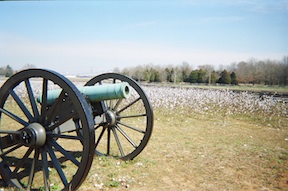The Battle of Stones River: “The nation could scarcely have lived….”
 With the Emancipation Proclamation set to go into effect on January 1, 1863, and the Army of the Potomac still in ruins after its humiliating defeat on the heights beyond Fredericksburg, Virginia, President Abraham Lincoln desperately needed a victory. Major General William Rosecrans, commanding the Army of the Cumberland in middle Tennessee, had for months resisted Lincoln’s prodding nearly as obstinately as George McClellan had resisted those same proddings in the east. Rosecrans’ deliberate bullheadedness hardly engendered confidence—at a time when the entire nation’s eyes turned westward, toward his army, as the last days of the year ticked away.
With the Emancipation Proclamation set to go into effect on January 1, 1863, and the Army of the Potomac still in ruins after its humiliating defeat on the heights beyond Fredericksburg, Virginia, President Abraham Lincoln desperately needed a victory. Major General William Rosecrans, commanding the Army of the Cumberland in middle Tennessee, had for months resisted Lincoln’s prodding nearly as obstinately as George McClellan had resisted those same proddings in the east. Rosecrans’ deliberate bullheadedness hardly engendered confidence—at a time when the entire nation’s eyes turned westward, toward his army, as the last days of the year ticked away.
With Confederates hunkered down near Murfreesboro, Tennessee, Rosecrans finally lumbered after them—with just over half of the men available to him—on the day after Christmas. The Federals bumped into their Southern counterparts on Dec. 29, and the two armies formed up for battle, which finally erupted on Dec. 31.
Rosecrans planned to hit the Confederates on the right, but Confederate commander Braxton Bragg launched his attack first, aiming for the Federal right. “Many of the Yanks were either killed or retreated in their nightclothes,” a Texan recalled. “We found a caisson with the horses still attached lodged against a tree and other evidences of their confusion.”
 Phil Sheridan’s division led a stout defense in an area that later became known as the Slaughter Pen, but as they ran out of ammunition, Sheridan’s men fell back. Confederates exploited the opportunity. “I cannot remember now of ever seeing more dead men and horses and captured cannon all jumbled together, than that scene of blood and carnage,” wrote Sam Watkins of Tennessee. “[T]he ground was literally covered with blue coats dead.”
Phil Sheridan’s division led a stout defense in an area that later became known as the Slaughter Pen, but as they ran out of ammunition, Sheridan’s men fell back. Confederates exploited the opportunity. “I cannot remember now of ever seeing more dead men and horses and captured cannon all jumbled together, than that scene of blood and carnage,” wrote Sam Watkins of Tennessee. “[T]he ground was literally covered with blue coats dead.”
After a day of fierce fighting, the Union position crumpled but did not completely collapse. Rosecrans seriously considered withdrawal that evening because his position was so compromised. Bragg, meanwhile, wired to Richmond about his army’s success. “The enemy has yielded his strong position and is falling back. We occupy [the] whole field and shall follow him…” Bragg said. “God has granted us a happy New Year.”
In the morning, Rosecrans still occupied his tight defensive formation. Bragg awaited retreat or attack but took no initiative of his own. The two armies spent New Year’s Day staring at each other.
On Jan. 2, late in the day, Bragg finally sent division commander John C. Breckenridge against the Federal left in what became a suicide mission. Federal artillery lined up along the crest of a hill on the far side of Stones River shredded Breckenridge’s advance: he lost nearly a third of his men. “The very forest seemed to fall,” Union Major General Thomas J. Crittendon observed, “and not a Confederate reached the river.”
Federal reinforcements and supplies arrived on Jan. 3, but Confederates had no such windfall. Although he’d arguably had the better end of the fight, Bragg withdrew.
Lincoln quickly turned the tactical draw into a major strategic achievement. “You gave us a hard-earned victory, which had there been a defeat instead, the nation could scarcely have lived over,” he told Rosecrans. The victory—such as it was—put some vitally needed military muscle behind the Emancipation Proclamation.
But Stones River crippled the Army of the Cumberland so badly that it would take six months for Rosecrans to feel recovered enough to move. When he did, his army moved cautiously, carefully—but skillfully—in what became known as the Tullahoma Campaign, which forced Bragg all the way back down to Chattanooga in Tennessee’s southeast corner.
In a theater of the war that already gets overshadowed by events in the east, the Battle of Stones River often gets overshadowed by the more famous battles at Shiloh and Chickamauga (and Vicksburg, for that matter, although that’s a different Federal army). However, the stakes at Stones River could not have been higher considering the political environment at that historical moment. The story of the Emancipation Proclamation would have been written far differently had Rosecrans withdrawn after that first night of battle, or had Bragg’s plan of attack unfolded differently after that first day. “The nation,” said Lincoln, “could scarcely have lived….”
Like that you point out this seemingly “small” battle’s political significance for setting the stage for the Emancipation Proclamation. Enjoyed it. Thank you!
You’re welcome. Stones River gets so overlooked, but it’s a great battlefield to visit and a pretty fascinating battle to study.
This is an insightful essay on Stones River. The Tullahoma Campaign was significant as you say as it maneuvered General Bragg all the way out of Tennessee without forcing a major battle or large loss of life. General Grant could have learned a lot from that campaign.
Thanks. I’ve always been interested in James Garfields’ role in planning (or not) the Tullahoma Campaign. My friend Chris Kolakowski has a good book on Stones River & Tullahoma that’s worth checking out if you get the chance.
I’m a little embarrassed to say I had not heard of this book on a subject that I am very interested in. I ordered it today. When will you write a book about the Western Theater? You seem to know more than most authors.
-Dave